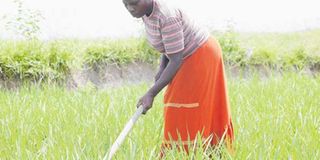New seed variety to raise rice yields

Welezo villager Monica Jilabi works at her farm in Shinyanga Region. TXD 3016, Saro 5 hybrid rice variety has hugely improved productivity. PHOTO | courtesy
What you need to know:
- Researchers admitted that among the challenges facing rice farmers which force others to lose hope is birds that attack the crops, but that problem has been solved.
Dar es Salaam. The Tanzania Agriculture Research Institute (Tari) has come up with a new paddy seed variety that is resistant to attack by pests and tolerant to effects of climate change.
Researchers admitted that among the challenges facing rice farmers which force others to lose hope is birds that attack the crops, but that problem has been solved.
The seed variety known as Semi Aromatic (Saro) 7 or Red was approved this year.
A researcher from Tari-Dakawa Mr Ngabo Pamba told The Citizen recently that the new seed will soon be distributed to farmers.
It is designed in such a way that it has a colour which makes it difficult for birds to know whether the rice is fresh or mature.
“One of the goals of the institute is not only to produce seeds, but to respond to the challenges of facing farmers so they can raise their productivity. It is also to ensure that consumers get the good taste of what we come up with and also to respond to challenges such as climate change, disease and pests,” he said.
He said in Tanzania there were more than 1 million smallholder farmers engaging in rice farming and that rice was currently doing well in the market and its demand was growing in neighboring countries.
Through the new seed the farmer can get up to 5 tonnes of rice per hectare. Seeds that are currently in use produce less than that.
Data from the Ministry of Agriculture show that last year, Tanzania earned a total of Sh476.29 billion by exporting a total of 441,908 tonnes of rice in various countries.




